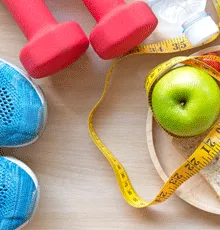
There are as many myths about food and weight loss as there are regarding the Loch Ness Monster and Babe Ruth’s Curse. We asked Richard Siegel, MD, a endocrinologist with the Weight and Wellness Center at Tufts Medical Center to break through these common misconceptions for anyone trying to lose weight.
Myth #1: You must cut out all carbs (or fat) to lose weight.
“I never advise anyone to cut out an entire category of food, no matter how popular the latest fad diet may be. Our bodies require diverse and varied nutrients to work properly. We know that too many foods today are processed and high in refined sugars or starches; foods like white bread, white rice, refined crackers, desserts, soda. You should avoid those foods, but other carb-containing foods such as fruits, vegetables and whole grains are important for your health and provide dietary fiber as well as phytochemicals which actually have positive metabolic effects. As for avoiding fats, some studies have shown that higher-fat diets, such as Mediterranean-style diets and low-carb diets are better than low-fat diets if you want to lose weight. Eating plans need to be individualized. I recommend partnering with a registered dietitian when possible.”
Myth #2: While losing weight, I will be hungry.
“It surprises many of my patients to learn that some of the best foods for losing weight are actually among the most filling. I advise patients to eat a diet rich in fruits, vegetables, nuts, beans and whole grains. These, along with some minimally processed foods, can keep you feeling satisfied longer. It may be because they are digested more slowly, and the slower release of starch and sugars into the bloodstream helps to keep away hunger pangs for longer periods of time. A study at the National Institutes of Health found that people are hungrier, eat more and gain weight while eating ultra-processed foods, and the exact opposite is true when you stick with a diet rich in minimally processed foods.”

Myth #3: Consuming six small meals a day (or fasting for a part of the day) is better than eating three traditional meals.
"Eating ‘mini-meals’ is very popular with trainers and several fad diets popular right now, but there’s no scientific proof that eating smaller, more frequent meals throughout the day will help you eat less or lose weight. For some people, eating smaller meals every several hours does prevent their blood sugar from dropping, which can lead to increased hunger between meals. Some people actually wind up eating more when they eat multiple, small meals. As for intermittent fasting, this works for some, but not for everyone. We can all agree that more research is needed. My advice is to talk with your doctor or a registered dietitian to see which plan you have the most success with.”
Myth #4: Losing smaller amounts of weight slowly will help you keep it off, compared with losing a lot of weight quickly.
"The National Weight Control Registry (NWCR) has followed over 10,000 individuals who have lost weight and maintained at least 30 pounds over a year or more. Some people have lost weight quickly while others lost weight over many years. The NWCR has shown that some of the keys to successful weight maintenance include careful weight monitoring and a high level of physical activity every day. They also tend to eat a lower calorie, lower fat diet and the majority eat breakfast daily. Thus, long-term skills are more important for weight maintenance than how the weight was lost.”
Myth #5: I’ll lose fat when I lose weight.
“Many people assume fat is the first thing to go when you lose weight, but if you don’t stay active you will likely also lose muscle. Preserving, and even building muscle mass, is important for both your long-term health and for maintaining weight loss. Muscle and a good metabolism go hand-in-hand. If you have less muscle mass, you’ll burn fewer calories each day. Many studies show that it isn’t enough to just work out if want to lose weight and keep it off. According to a 2018 review of studies published in the journal Progress in Cardiovascular Diseases, activity alone—resistance training, aerobic exercise, or a combination of both—resulted in zero to three percent weight loss, while weight-loss diets in combination with aerobic activity (like brisk walking, swimming, or bicycling) resulted in five to fifteen percent weight loss. And yes, when you work out, you might find yourself wanting to eat more. So it’s important to eat healthy foods that assist in weight loss and avoid the pitfalls of many over-processed, quick snack foods.”
The above content is provided for educational purposes by Tufts Medical Center. It is free for educational use. For information about your own health, contact your physician.